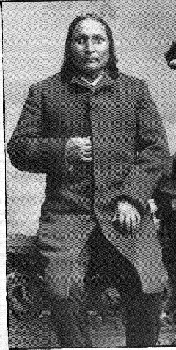LONE WOLF II

In 1784, near Greer County, Lone Wolf II (Momaday) with a band of Comanche warriors fought Major William's men under the command of Colonel G. F. Buel in Lone Wolf's last battle with the United States Army.
In 1901 the Kiowa-Comanche section of Oklahoma Territory was opened for white settlement. Lone Wolf brought a suit to stop the land opening through an injunction. But Clinton F. Erwin, Judge of the Territorial Federal Court, tore up the application and denied the request of the Kiowa. Lone Wolf made a trip to Washington to see President McKinley, hoping to stop the lottery. However the suit was a failure.
Lone Wolf died at his homestead southwest of Hobart, June 24, 1924 at the age of 76. He was the last of the recognized chiefs of the Kiowa. Lone Wolf is buried south of Hobart in the Elk Creek Indian Cemetery. After this there were no real chiefs.
In his time, Lone Wolf soared to the lofty heights of chieftain, and felt the exhilarating chase of the warrior. He saw his domain covering Oklahoma, Kansas, Texas and part of Old Mexico shrink to a mere one hundred sixty acre allotment. The Chief saw a way of life end and a new way begin to take root. He witnessed the endless stream of settlers day after day that sealed the doom of Kiowa life on his beloved plains.
Information from "The Ten Grandmothers" by Alice Marriott, published by
University of Oklahoma Press, Norman, OK, 1945; and "Calender History of the
Kiowa Indians" by James Mooney, published by Smithsonian Institution Press,
Washington, D.C. from reports, 1895-1896.
This information compiled, prepared and submitted to this site by Ethel Taylorand remains the property of the
submitter
Turn to Next
Page
Return to Kiowa
Photo Album
Return to Kiowa
Page
Copyright, 2000-2002
This information compiled, prepared and submitted to this site by Ethel Taylorand remains the property of the
submitter
NOTICE: Ethel Taylor grants that this information and data may
be used by non-commercial entities, as long as this message remains on all
copied material, for personal and genealogical research. These electronic pages
cannot be reproduced in any format for profit, can not be copied over to other
sites, linked to, or other presentation without written permission of Ethel
Taylor.
NOTICE: Ethel Taylor grants that this information and data may be used by non-commercial entities, as long as this message remains on all copied material, for personal and genealogical research. These electronic pages cannot be reproduced in any format for profit, can not be copied over to other sites, linked to, or other presentation without written permission of Ethel Taylor.